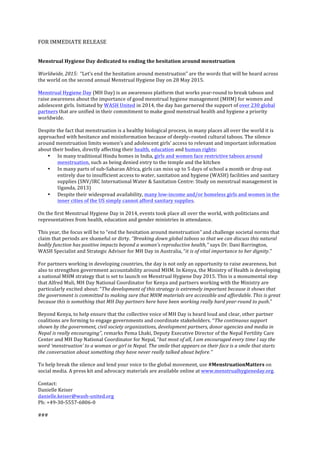
MHDayPressRelease_2015
- 1. FOR IMMEDIATE RELEASE Menstrual Hygiene Day dedicated to ending the hesitation around menstruation Worldwide, 2015: “Let’s end the hesitation around menstruation” are the words that will be heard across the world on the second annual Menstrual Hygiene Day on 28 May 2015. Menstrual Hygiene Day (MH Day) is an awareness platform that works year-‐round to break taboos and raise awareness about the importance of good menstrual hygiene management (MHM) for women and adolescent girls. Initiated by WASH United in 2014, the day has garnered the support of over 230 global partners that are unified in their commitment to make good menstrual health and hygiene a priority worldwide. Despite the fact that menstruation is a healthy biological process, in many places all over the world it is approached with hesitance and misinformation because of deeply–rooted cultural taboos. The silence around menstruation limits women’s and adolescent girls’ access to relevant and important information about their bodies, directly affecting their health, education and human rights: • In many traditional Hindu homes in India, girls and women face restrictive taboos around menstruation, such as being denied entry to the temple and the kitchen • In many parts of sub-‐Saharan Africa, girls can miss up to 5 days of school a month or drop out entirely due to insufficient access to water, sanitation and hygiene (WASH) facilities and sanitary supplies (SNV/IRC International Water & Sanitation Centre: Study on menstrual management in Uganda, 2013) • Despite their widespread availability, many low-‐income and/or homeless girls and women in the inner cities of the US simply cannot afford sanitary supplies. On the first Menstrual Hygiene Day in 2014, events took place all over the world, with politicians and representatives from health, education and gender ministries in attendance. This year, the focus will be to “end the hesitation around menstruation” and challenge societal norms that claim that periods are shameful or dirty. ‘’Breaking down global taboos so that we can discuss this natural bodily function has positive impacts beyond a woman’s reproductive health,’’ says Dr. Dani Barrington, WASH Specialist and Strategic Advisor for MH Day in Australia, “it is of vital importance to her dignity.’’ For partners working in developing countries, the day is not only an opportunity to raise awareness, but also to strengthen government accountability around MHM. In Kenya, the Ministry of Health is developing a national MHM strategy that is set to launch on Menstrual Hygiene Day 2015. This is a monumental step that Alfred Muli, MH Day National Coordinator for Kenya and partners working with the Ministry are particularly excited about: “The development of this strategy is extremely important because it shows that the government is committed to making sure that MHM materials are accessible and affordable. This is great because this is something that MH Day partners here have been working really hard year-‐round to push.” Beyond Kenya, to help ensure that the collective voice of MH Day is heard loud and clear, other partner coalitions are forming to engage governments and coordinate stakeholders. ‘‘The continuous support shown by the government, civil society organizations, development partners, donor agencies and media in Nepal is really encouraging’’, remarks Pema Lhaki, Deputy Executive Director of the Nepal Fertility Care Center and MH Day National Coordinator for Nepal, “but most of all, I am encouraged every time I say the word ‘menstruation’ to a woman or girl in Nepal. The smile that appears on their face is a smile that starts the conversation about something they have never really talked about before.’’ To help break the silence and lend your voice to the global movement, use #MenstruationMatters on social media. A press kit and advocacy materials are available online at www.menstrualhygieneday.org. Contact: Danielle Keiser danielle.keiser@wash-‐united.org Ph: +49-‐30-‐5557-‐6806-‐0 ###
- 2. Additional quotes about Menstrual Hygiene Day 2015: “It’s really exciting to see the momentum growing as we move towards celebrating Menstrual Hygiene Day for the second year. I am truly inspired by our partners’ passions to help break the silence around menstruation. There is still a long way to go with regards to ensuring that every woman and girls’ menstrual hygiene needs are met. Therefore we as the Secretariat of Menstrual Hygiene Day invite every global and local voice to join in and help ‘end the hesitation around menstruation’. – Ina Jurga, Head of WASH in Schools, WASH United (Germany) and MH Day Global Coordinator “In Pakistan it is really difficult to openly discuss menstruation, even with women. The first Menstrual Hygiene Day in 2014 helped to start breaking the silence. And now we are discussing the issues with men too. This is how we are trying to change attitudes towards menstruation and the health issues that come along with it in the male-‐dominated society of Pakistan.” – Ikhtiar Khaskhelly, Executive Director of KRDO and MH Day National Coordinator for Pakistan “Menstrual Hygiene Day makes audible and visible a growing transnational movement that promotes body literacy and autonomy, and fundamentally, gender equality. We need everyone, everywhere, to speak out and listen up: menstrual health is a matter of human rights!’’ – Professor Chris Bobel, President-‐Elect of the Society of Menstrual Cycle Research and author of New Blood: Third Wave Feminism and the Politics of Menstruation "Many girls with disabilities are excluded from MHM interventions because of the misconceptions surrounding disability. More than ever we need to keep the flow going and break the silence on MHM. I’m happy to see Menstrual Hygiene Day doing exactly that." – Chukwuma Kingsley, Project Coordinator, Inclusive Friends (Nigeria) and MH Day Strategic Advisor "We are mobilizing partners to turn Washington D.C. into a hub for exciting activities around Menstrual Hygiene Day, ranging from engaging policymakers to promoting alternative, sustainable products to putting on exhibitions for local school children‘’-‐ Sarah Fry, Senior Hygiene and School WASH Advisor at WASHplus and MH Day National Coordinator for Washington D.C.
